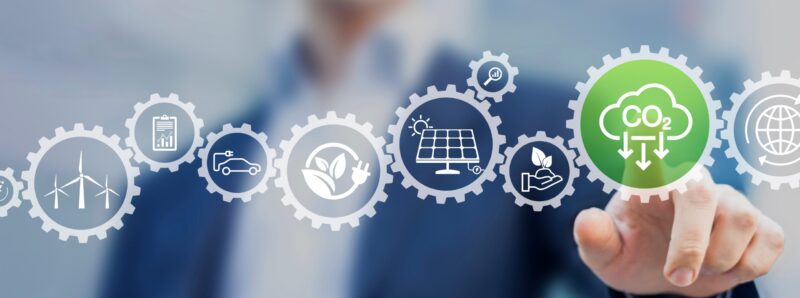
This site
is mobile
responsive

Malaysia has set its sights on achieving carbon neutrality by 2050, as part of the Twelfth Malaysia Plan (12MP). To meet this ambitious target, the country has pledged to reduce its greenhouse gas (GHG) emissions by up to 45% by 2030, in accordance with the Paris Agreement. With the energy sector being a key driver of both carbon emissions and sustainable development, Malaysia is now focusing on enhancing energy efficiency and reducing reliance on conventional energy sources.
In 2022, the Government unveiled the National Energy Policy (NEP) 2022-2040 aimed at propelling the country’s energy sector as a key driver of growth for its socioeconomic development. The policy focuses on low-carbon development, resource efficiency, and environmental and natural resource sustainability.
To achieve this, the NEP has identified integrated carbon capture, utilisation and storage (CCUS) as critical enabling technologies. These technologies are expected to drive sustainability in industrial operations and complement the renewable energy (RE) sector’s value chain.
CCUS is an innovative technology that prevents carbon dioxide (CO2) from entering the atmosphere by capturing CO2 emissions from industrial sources preventing them from being released into the air. The captured CO2 can then be reused or stored in large-scale injection and long-term storage facilities. By transforming GHG emissions into valuable investments, CCUS will enable Malaysia to achieve its net zero GHG emissions target by 2050.
According to the International Institute of Energy (EIA), there are currently about 35 commercial CO2 capture facilities operating globally, with a total annual capture capacity of 45 million tonnes per annum (Mtpa) of CO2. In the next decade, carbon capture is estimated to grow by 370 Mtpa, mainly in North America and the UK. Storage capacity is also expected to increase from 75 Mtpa to around 500 Mtpa by 2033, with the US, UK, Canada and Australia accounting for two-thirds of global storage capacity by that time.
Malaysia’s leading energy group, PETRONAS has taken up the challenge to develop one of the world’s largest offshore carbon capture storage (CCS) projects by 2025. Along with the Malaysia Marine and Heavy Engineering Holdings Berhad (MHB), they aim to develop CCS at the Kasawari gas field in Bintulu, Sarawak. This project is expected to mitigate around 80 million tonnes of CO2 with an annual average of 3.3 Mtpa, which will either be injected into the reservoir via a subsea pipeline or permanently stored at identified underground locations securely.
PETRONAS is also collaborating with foreign multinational corporations (MNCs) such as ExxonMobil (USA), Samsung and POSCO (Korea), and Japan Petroleum Exploration Co., Ltd. (JAPEX) and Mitsui (Japan) to explore and develop CCS technologies. This includes the scope of CO2 capture and separation, CO2 transportation value chain and CO2 storage solutions. The captured CO2 can potentially be converted into useful chemicals or fuels, as well as enhanced oil recovery – adding value to CO2 waste and providing end-to-end solutions for addressing climate change.
To ensure the successful deployment of CCS projects in Malaysia, significant capital investments and extensive support from various stakeholders play a vital role in accelerating the growth and execution of these large-scale carbon projects. Government intervention, industry leaders, financial institutions, and policymakers all have an important role to play in ensuring the success and implementation of the CCS project across industries.
As envisaged under the NEP, the Low Carbon Nation Aspiration 2040 has been developed to emphasise low carbon policies and investments, with the goal of increasing adoption and pursuing selective leadership in low carbon sectors. In line with this aspiration, the Government introduced catalytic incentives and supportive regulatory frameworks in Budget 2023 to spur investment and transition to a low carbon economy growth ecosystem for Malaysia. As part of this initiative, the Government has identified the use of CCS technology as a means of reducing CO2 emissions.
The oil and gas and power generation industries will be a pioneer in leveraging the following activities of CCS technology in Malaysia:
To recognise CCS activities as a new source of economic growth and to achieve net-zero GHG emissions, the following tax incentives have been introduced:
i. Companies undertaking in-house CCS activity
ii. Companies undertaking CCS services
iii. Companies using CCS services will be given tax deduction on fees incurred for the use of services.
Effective Date of Application
CCUS/CCS technology has the potential to create business opportunities in Malaysia, including the RE market, energy efficiency, and carbon credit trading. It is also expected to generate significant positive economic development impacts, such as higher Gross Domestic Product (GDP) and job creation. However, potential challenges, including the energy trilemma, high costs of technologies, technological barriers, and public acceptance, must be overcome. To achieve equilibrium, Malaysia must continuously monitor and review evolving policy, technological and business market trends. This will enable the country to become a leader in the development and implementation of CCS technology in this region.
For further enquiries and interested parties, please get in touch with the Green Technology Division of MIDA at https://www.mida.gov.my/staffdirectory/green-technology-division/
